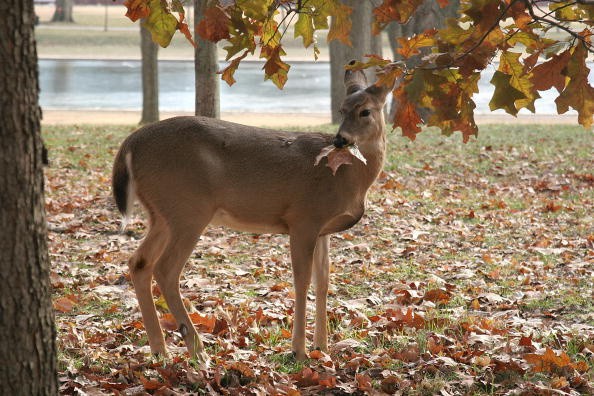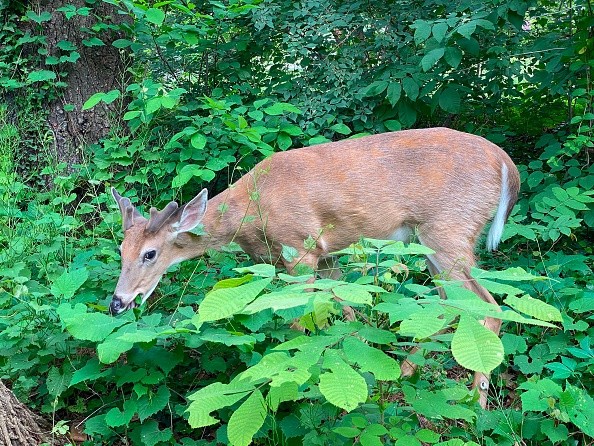Coronavirus has infected cats, dogs, and ferrets. But in deer, outbreaks seem to be distinct. In just one week of November 2020, the number of Covid-19 cases in Iowa reached 32,081 (a record high at the time).
SARS-CoV-2, the virus that causes Covid-19, was found in 80 of the 97 deer tested in a seven-week survey following the Iowa outbreak. The virus is not limited to Iowa. Deer diseases have been found to be common across the country.

Covid-19 Spillover in Deer
The United States is home to tens of millions of deer. According to studies, the numbers infected is likely to be high.
In laboratory studies, the virus appears to cause asymptomatic infections in the deer, but this is not the primary concern here. These deer epidemics are being described by veterinary infectious disease experts as a probable Pandora's box, and the small but real possibility that it will lead to future versions infecting humans or spreading to other wildlife is now open.
A deer's infection can only be detected on a PCR test for a short period of time before it clears their system. These findings were alarming since analyses suggest that there was a greater percentage of their population infected with this virus than human beings, as the researchers put it.
Currently, the SARS-CoV-2 pandemic is not only focused on the transmission of SARS-CoV-2 in the animal population. Humans continue to spread the virus and die as a result. The repercussions of realizing these threats to animals could be dire. Scientists want to keep an eye out for any threats lurking in the woods.
According to VOX, outbreaks in deer may lead to new variants which are likely to infect humans, or spread to other wildlife, making them sick.
How Did Deer Get Infected?
Animals can be infected with SARS-CoV-2, and this isn't news. The virus may have begun in an animal species and subsequently spread to humans, a process known as spillover, by which a virus spreads between species. Many animals have been infected with the virus since the epidemic began, with varying degrees of disease.
A wide range of animals, including lions and pumas, cats and dogs, tigers and tigers, ferrets and some rodents, mink, snow leopards, and others, have been infected.
Pets can be protected from Covid-19 by following CDC recommendations. Scientists term it "spillback" when a virus spreads from animals to humans and then back again.
These animal illnesses seemed to be mostly contained within themselves. When infected, a house cat is unlikely to spread the disease to other cats in the house.
The diseases in the deer were unique. According to Kuchipudi, this is the first time that a completely free-living animal species has been confirmed to be infected, and that infection is widespread.
Exactly how the disease spread from humans to animals is still a mystery, but scientists do believe that humans are to blame for the current outbreak. The virus that infected the deer shared genetic sequences with the virus that infected people at the time.

Why Humans Should be Worried About Deer-to-Deer Transmission
It is possible for viruses to acquire genomic mutations when they replicate in the human body, leading to variants such as alpha and delta. The virus evolution becomes twice as difficult when the virus spreads to a new species.
This is the infection's "insurance policy," as scientists put it. Humans' immune systems may be unable to fend off a new strain of the virus even after the current epidemic has ended, which may take up to 10 years. It's possible that the omicron variant came from an animal population.
The infection could spread beyond deer, which is the next area of concern. According to Olson, the virus could be spread to other animals by the deer. Let's say a deer infected with the coronavirus comes into contact with other mammals, such as a mountain lion that kills a deer, or an ermine that eats a deer's carcass. The virus could spread to these other animals.
Many different species could be infected with Covid-19 if the virus spreads to these other species. All of this is merely speculative.
But even if it did, scientists wouldn't know for sure. Even for humans, contact tracing can be a difficult task, but when you consider the vastness of the animal kingdom, it becomes even more so. Researchers must approach this with humility, says Kuchipudi.
Related Article : Coronavirus Oubreak in Animals: 60% of Deer in Michigan Tested Positive for COVID-19
For more news, updates about deers and similar topics don't forget to follow Nature World News!
© 2025 NatureWorldNews.com All rights reserved. Do not reproduce without permission.





